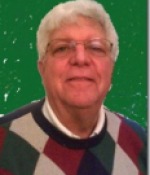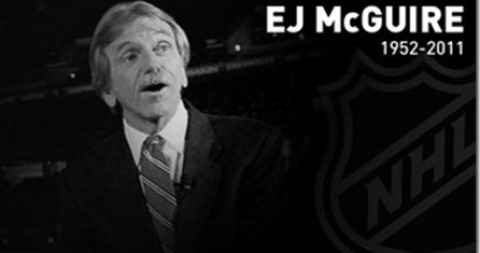We only had a few opportunities to speak with E.J. McGuire. Sure we could have written something that would have sounded either totally disconnected and written like some heartless obituary. Instead we decided to speak to a few of the people who knew him best and get their thoughts on the loss of not only the Hartford Wolf Pack’s first coach, but their friend and colleague.
After reading this story, we hope you’ll share your recollections of this truly fine person.
We’ll start with Gerry Cantelon who has been covering hockey in the state of Connecticut for the Associated Press and Waterbury Republican-American, Elm City Citizen Newspapers and Hat Trick magazine, plus numerous independent hockey publications and websites for more years than any of us care to remember. He has covered the Hartford Wolf Pack, and later the Connecticut Whale from day one and of all of the reporters around knew McGuire best.
 By Gerry Cantlon
By Gerry Cantlon
Special to Howlings
The announcement of the loss of the Hartford Wolf Pack’s first head coach E.J. McGuire struck hard Thursday afternoon. At a far too young age of 58, cancer claimed one of hockey’s most erudite men.
A committed long distance runner McGuire was experiencing knee pain when he sought answers from doctors when his cancer was discovered. McGuire had contracted a rare cancer, leiomyosarcoma, that affects the soft tissues and had metastasized so thoroughly throughout him, that he passed away a mere four months after being diagnosed.
The term “erudite” fits the bill perfectly for McGuire. He was always an in motion man who had a passion for the game of hockey and clearly had an IQ that exceeded the boundaries of the hockey rink. That passion was obvious to former Wolf Pack defenseman Todd Hall who played under McGuire.
“He was a great coach to play for and because he was a different type of coach. He approached things from a psychological perspective,” said the Hamden native who spent seven years with the team and for both of McGuire’s.
With a degree in psychology he was saw a player from this prism and Hall said it was very effective for him.
“He had goals for every game, things were very structured and he was very disciplined. He was very up front with us; you knew exactly where you stood. He was a very detailed coach, which was fine by me as my high school coach Dick Gagliardi was the same way.”
He was always using little sayings to motivate players and Hall absorbed it well. “He inspired us with them; it was contagious and was important. I use those same sayings now today coaching kids (he is an assistant coach with Hamden High). I have the utmost respect for E.J. this is so sad and awful,” said Hall.
The often-controlled emotions of McGuire did boil over occasionally with some comical results.
“E.J. was firm with us, but he wasn’t a screamer like some coaches. After one particularly bad game he had that walk and you could see he was seething. Most coaches kick the garbage can or break a hockey stick he reached for the nearest thing it was his car keys. He fired them at the wall and walked out, we laughed about it, but we also got the message,” remarked Hall.
He never played the game, but he worked from the lowest collegiate ranks of SUNY-Brockport a Division II program to the NHL and was the VP of the NHL Central Scouting department at the time of his death.
For this reporter, he was a gentleman and one of the most accommodating coaches I have had the pleasure to deal with. The intellect he had made him not your average coach, because he listened to your question. The answers were mostly devoid of profanity, not that he didn’t occasionally drop an F-bomb, but he was cerebral enough to answer you and teach you at the same time where he was at.
When Swedish winger Johan Witehall was on the team, he grilled me mercilessly to properly pronounce his name, it was helpful. When the highly popular P.J. Stock got into a scrap in a game against Rochester he had come off the bench and engaged in the fight and was given a game misconduct for coming off the bench to initiate a fight—a very suspendable offense for both the player and coach.
In the hallway, a clearly agitated McGuire was talking with Stock as we in the media waited.
When he came out, I asked him about it and he replied as only E.J. could, “I politely told him it’s not smart to come off the bench and begin a fight with the referee five feet away.”
He had problems, as did every coach after him, with the highly talented Marc Savard, who tested everyone’s patience in those days. After a return from his first recall to the Rangers where he played with the Wayne Gretzky and scored his first NHL goal, upon being asked if Savard was ready to make it to the NHL. McGuire retorted, “He’s 700 goals behind Gretzky. He has a ways to go.”
He praised people such as Ben Carpentier, a third line banger and crasher who often was scratched hoping to ride with him in a Calder Cup parade in Hartford.
The only cross words I ever had with him were in regards to a section of Hartford.
We were talking about the teams marketing efforts in the community and I said I don’t think going to the Frog Hollow section would be a safe place for anybody.
He glared at me and began to read me the riot act about what a racist comment I had made about French people using the word frog! Eventually with the assistance of former Hartford Courant reporter David Hueschkel we were able to explain to him it wasn’t racist, but the actual name of that section of Hartford and it was indeed a dangerous place.
He immediately apologized; we had a laugh about it the rest of the season.
In Hartford, hockey history will remember E.J. forever as being a big part of the building block what became the 2000 Wolf Pack Calder Cup title. To the rest of the hockey world, this is a devastating loss. For the McGuire family, his elder daughter Jacqueline, who was born in Hartford, and his younger daughter Erin as well as his incredible wife Terry, for them, the pain in this loss must be incalculable.
My deepest condolences to Jacqueline, Erin and Terry; may you rest in peace E.J. You will be sorely missed.
 BRUCE BERLET – (Hockey Writer, beat writer for the Hartford Whalers for the Hartford Courant on and off from 1975 – 1984, and who has covered the Hartford Wolf Pack from 1999-2000, the Calder Cup championship season, through the 2007-2008 season for the Hartford Courant. Since 2008 to the present he has worked for the Wolf Pack and Whale and has been a contributor to Howlings as well).
BRUCE BERLET – (Hockey Writer, beat writer for the Hartford Whalers for the Hartford Courant on and off from 1975 – 1984, and who has covered the Hartford Wolf Pack from 1999-2000, the Calder Cup championship season, through the 2007-2008 season for the Hartford Courant. Since 2008 to the present he has worked for the Wolf Pack and Whale and has been a contributor to Howlings as well).
I didn’t start covering the team until the season after E.J. left Hartford, but the man who spent more than 40 years in hockey as a coach and administrator was always so pleasant and energetic whenever I met him after he guided the Wolf Pack to an 81-55-17-7 record in 1997-98 and 1998-99 and a berth in the Eastern Conference finals in the team’s inaugural season to his tenure as vice president of the NHL Central Scouting Bureau, a position he held from 2005 until he got beat by an opponent that no one beats at 58.
I’m sure the passionate and tireless E.J. is smiling through that familiar moustache somewhere in that Great Rink in the Sky.
GEORGE DALEK – (Hockey writer, covered the Hartford Whalers for Stan Fischler from 1982-84 and then covered the Whalers and Wolf Pack at the Record-Journal from 1984-2010).
The one thing that stood out about E.J. was his work ethic. 10-, 13-, 16-hour days were the rule rather than the exception. Much of that time was spent breaking down video tape to prepare for games, but also to use as constructive criticism or positive reinforcement in one-on-one meetings with players.
As for games, in his mind, there was no such thing as being over-prepared.
E.J. was a very bright guy, more like a professor than a coach. He was a cerebral fellow who was into fitness (you’d see him running the streets of downtown Hartford every day), motivation, and X’s and O’s, though he had a pretty simple (but successful) system when he coached the Wolf Pack.
He had an undergrad degree in physical education and a doctorate in sports psychology. He was a sponge with a thirst to learn, attending as many coaching clinics as he could. He certainly learned plenty as Mike Keenan’s assistant for seven years in the NHL and as an unpaid assistant in Rochester for one Calder Cup-winning campaign.
E.J. worked well as a teacher with the younger players in Hartford, although he knocked heads with some of the more stubborn ones. “My role is to teach them,” he said of working with young players like Marc Savard. “They’re going to hear my opinion of what it takes to be a pro. Whether they accept it or not is up to them. I ask them to listen and discount it or remember it. Perhaps someday, it’ll come true.”
I enjoyed the time I worked with him. EJ will be sorely missed.
 BOB CRAWFORD – (Voice of the Hartford Wolf Pack / Connecticut Whale from Day One to Present)
BOB CRAWFORD – (Voice of the Hartford Wolf Pack / Connecticut Whale from Day One to Present)
EJ was a great hockey guy, a great friend and a great family man. Among all the people I’ve ever met in the game of hockey, nobody was a better guy to be around, or more giving of himself, than EJ. I bet you couldn’t find one person who knew him who would say a bad thing about him. One of the all-time great people I’ve ever had the privilege of knowing, inside or outside of hockey.
(Photo courtesy of NHL.com)




Leave a Reply